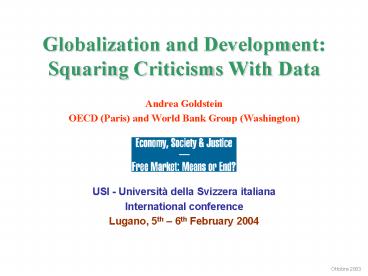Globalization and Development: Squaring Criticisms With Data PowerPoint PPT Presentation
1 / 23
Title: Globalization and Development: Squaring Criticisms With Data
1
Globalization and Development Squaring
Criticisms With Data
- Andrea Goldstein
- OECD (Paris) and World Bank Group (Washington)
- USI - Università della Svizzera italiana
- International conference
- Lugano, 5th 6th February 2004
2
Outline
- The sad state of the world
- Does globalization cause underdevelopment? Or
would more globalization make it easier to fight
poverty? - What role for the international community?
3
If the World were 100 People, what would we see?
- 80 in sub-standard housing
- 70 cannot read
- 1 with a college education
- 50 not enough to eat
- 59 of the Worlds wealth belongs to 6 people
- And all 6 in the US
- 99 cannot read this
- Because they have no computer
- 57 Asians
- 21 Europeans
- 14 from North and South America
- 8 Africans
- 52 female
- 70 non-white
4
Divario nei redditi pro-capite
5
Popolazione in stato di povertà estrema (lt 1 al
giorno)
6
Tasso di contagio HIV
7
Tasso di mortalità infantile(bambini morti prima
dei 5 anni ogni 1000 nati)
8
Completamento delleducazione elementare ( dei
bambini in età scolare)
9
Globalisation and poverty the criticisms
- Free trade is unfair
- rules (e.g. TRIPS) are unbalanced
- increases poverty in DCs and weakens social
safety nets in OECD countries - threatens human rights and the environment
- destroys the social fabric
- IFIs are undemocratic
10
Globalisation and poverty the (some?) data
- Although convergence has halted since circa 1970s
- countries that have become more global have grown
faster - and there is no evidence of a
race-to-the-bottom - although the list of urgent reforms is
certainly long!!
11
Globalisation and povertyRodriks policy
priorities
- Property rights and the rule of law are important
so that investors--both current and
prospective--can expect to retain the return to
their investments ? what is the best way to do
this under a societys existing institutional
preconditions?
12
Globalisation and povertyRodriks policy
priorities
- Private incentives need to be aligned with social
costs and benefits if productive efficiency is to
be achieved ? does this result in unconditional
support for the Washington Consensus (i.e. trade
liberalization, deregulation, and privatization)?
13
Globalisation and povertyRodriks policy
priorities
- Macroeconomic and financial stability require
- debt sustainability
- prudential regulation
- sound money.
14
Panoramica sugli aiuti allo sviluppo 2000
15
Aiuti allo sviluppo nel 2000 Miliardi di dollari
53.74
14
13.51
12
9.95
10
8
6
5.03
4.50
4.10
4
3.13
1.80
1.74
1.66
2
1.38
1.26
1.19
0.99
0.89
0.82
0.42
0.37
0.27
0.23
0.23
0.13
0.11
0
Italy
Spain
Japan
Austria
France
Ireland
Norway
Finland
Greece
Portugal
Sweden
Canada
Australia
Belgium
Germany
Denmark
Switzerland
TOTAL DAC
Luxembourg
Netherlands
United States
New Zealand
United Kingdom
16
Aiuti allo sviluppo 2000 in del reddito
nazionale dei Paesi donatori
1.2
1.06
1.1
1.0
0.9
0.84
0.80
0.80
UN Target 0.7
0.8
0.71
0.7
0.6
Average country effort 0.39
0.5
0.36
0.34
0.4
0.31
0.32
0.32
0.28
0.30
0.27
0.27
0.26
0.25
0.25
0.3
0.23
0.22
0.22
0.20
0.2
0.13
0.10
0.1
0.0
Italy
Spain
Japan
Austria
France
Ireland
Norway
Finland
Greece
Sweden
Belgium
Australia
Portugal
Canada
Germany
Denmark
Switzerland
TOTAL DAC
Luxembourg
Netherlands
United States
New Zealand
United Kingdom
17
(No Transcript)
18
(No Transcript)
19
Aiuti allo sviluppo italiani
20
The World Bank Mission
- Our Dream
- A world free of poverty.
- Our Mission
- To fight poverty with passion and professionalism
- To help people help themselves and their
environment - To be an excellent institution
- Our Vision
- To be the premier global development institution.
A respected leader and trusted partner catalyzing
knowledge and financial resources in the fight
against poverty.
21
Historical Notes Why are we Here?
IDA (1960) To promote economic development,
increase productivity and thus raise standards of
living in the less developed areas of the world .
. .
- IBRD (1946)
- To assist in the reconstruction and development
of territories of members by facilitating the
investment of capital for productive purposes . .
.
MIGA (1988) To encourage the flow of investments
for productive purposes among member countries,
and in particular to developing member countries
. . .
IFC (1956) To further economic development by
encouraging the growth of productive private
enterprise in member countries . . .
3
22
Some Historical Landmarks
- 1950s Financial Stability
- 1960s Venturing into new fields and countries
IDA - The McNamara Years Growth, reorganization
- Economic Crisis and Adjustment Lending
- 50th Anniversary 1994
- Strategic Compact 1997
- The Wolfensohn Era 1996-?
- 2000-2003 Globalization Debates?
- A World Out of Balance
23
(No Transcript)

